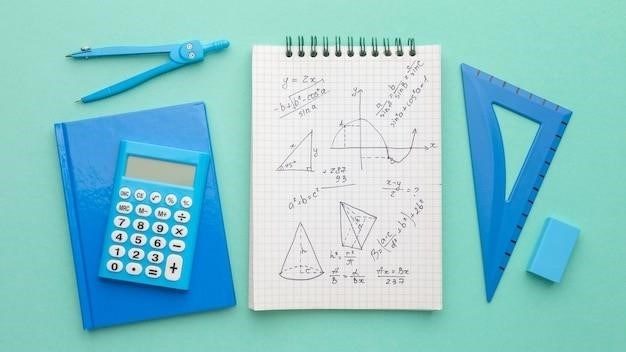What are ICAS Maths Past Papers?
ICAS Maths Past Papers are downloadable PDF documents containing past ICAS exam questions and answers․ These papers provide valuable practice for students preparing for the International Competitions and Assessments for Schools (ICAS) Mathematics assessment․
Understanding ICAS
The International Competitions and Assessments for Schools (ICAS) is an international assessment program conducted by the University of New South Wales in Australia․ It offers a range of tests for students of different age groups in various subjects, including Mathematics․ ICAS aims to assess student achievement in a variety of subjects, providing valuable insights into their understanding and skills․ The tests are designed to challenge students and encourage them to think critically and apply their knowledge in real-world contexts․ ICAS assessments are conducted in schools worldwide, with students sitting for the tests under normal examination conditions․
The Value of Past Papers
ICAS Maths Past Papers offer numerous benefits for students preparing for the ICAS assessment․ By studying these papers, students can familiarize themselves with the format and style of questions asked in previous years․ This helps them understand the types of problems they might encounter and develop effective strategies for solving them․ Past papers also provide valuable practice in time management, as students can simulate exam conditions and learn to allocate their time effectively․ Moreover, analyzing their performance on past papers allows students to identify their strengths and weaknesses, enabling them to focus their preparation on specific areas that require improvement․

Where to Find Free ICAS Maths Past Papers
While accessing free ICAS Maths Past Papers directly can be challenging, several resources provide access to these valuable study materials․
ICAS Website
The official ICAS website, managed by UNSW Global, is a primary source for accessing ICAS resources, including past papers․ While the website doesn’t offer free downloads of past papers, it does provide a valuable platform for purchasing them; Schools can purchase past papers directly from the ICAS website using a debit or credit card, without the need for a school code․ The past papers are available as electronic PDF documents, making them easily accessible and printable․ However, due to copyright restrictions, these papers cannot be returned or shared freely․ The ICAS website also offers a range of other resources, including sample questions, answer sheets, and information about the assessment process․
Third-Party Resources
While the official ICAS website is the primary source for purchasing past papers, several third-party resources offer free access to ICAS Maths past papers․ These resources often include websites, online platforms, and educational forums where users can download and share past papers․ Be cautious when using third-party resources, as the quality and accuracy of the materials may vary․ It’s essential to verify the source of the past papers and ensure they are authentic and aligned with the current ICAS assessment format․ Some third-party resources may offer practice tests, sample questions, and study guides that can complement the use of past papers․ These resources can provide a broader understanding of the ICAS assessment and help students prepare effectively․
Tips for Using ICAS Maths Past Papers
Using ICAS Maths past papers effectively can significantly boost your preparation for the assessment․ Here are some tips to maximize your learning from these resources․
Practice Regularly
Consistent practice is key to success in any exam, and ICAS Maths is no exception․ Regularly working through past papers allows you to familiarize yourself with the format, style, and difficulty level of the actual exam․ This consistent exposure helps build confidence and reduces test anxiety․ Aim to dedicate a specific time each week to tackling past papers, mimicking the exam environment as closely as possible․ This could involve setting a timer, working in a quiet space, and avoiding distractions․ The more you practice, the more comfortable you’ll become with the types of questions and the time constraints, ultimately leading to improved performance on the actual ICAS Maths assessment․
Analyze Your Performance
After completing a practice paper, it’s crucial to analyze your performance thoroughly․ Don’t just focus on the number of correct answers․ Identify the specific questions you struggled with and understand why․ Did you miss a key concept, make a careless mistake, or simply run out of time? Analyzing your errors helps you pinpoint your weaknesses and areas for improvement․ For example, if you consistently struggle with geometry problems, you may need to revisit that topic in your textbooks or seek additional practice resources․ This focused approach ensures that your practice is targeted and effective, maximizing your chances of success in the actual ICAS Maths assessment․
Identify Your Strengths and Weaknesses
As you work through past papers, you’ll naturally begin to identify areas where you excel and areas that require more attention․ This self-awareness is vital for your preparation․ For example, you might discover you’re confident with algebra but struggle with geometry․ This realization allows you to focus your practice․ Allocate more time to geometry problems, seek out additional resources for that topic, and potentially spend less time reviewing algebra concepts․ Identifying your strengths allows you to build confidence and reinforces your understanding of those areas․ By focusing on your weaknesses, you can address knowledge gaps and improve your overall performance in the actual ICAS Maths assessment․
Additional Resources for ICAS Maths Preparation
Beyond past papers, numerous online resources can further enhance your ICAS Maths preparation, including practice tests, sample questions, and study guides․
Online Practice Tests
Online practice tests offer a simulated ICAS exam experience, allowing students to gauge their preparedness and identify areas for improvement․ Platforms like RiSE provide access to dedicated ICAS practice tests, covering various subjects and year levels․ These tests often include detailed feedback and explanations, helping students understand their strengths and weaknesses․ Engaging in online practice tests familiarizes students with the exam format, time constraints, and question types, boosting their confidence and reducing exam anxiety; Many online practice tests are available for free, making them a valuable resource for students looking to supplement their ICAS preparation․
Sample Questions and Answers
Sample questions and answers provide a direct glimpse into the style and difficulty level of ICAS Maths exams․ These resources can be found on various websites and educational platforms, offering a focused approach to understanding specific mathematical concepts and problem-solving techniques․ By reviewing sample questions and answers, students gain valuable insights into the types of problems they might encounter during the actual exam․ This exposure helps them familiarize themselves with the expected format, terminology, and problem-solving strategies․ Additionally, analyzing the solutions to sample questions enhances students’ understanding of the underlying mathematical principles and improves their ability to apply them effectively․
Study Guides and Textbooks
Study guides and textbooks provide a comprehensive framework for ICAS Maths preparation․ These resources offer detailed explanations of key mathematical concepts, along with practice problems and worked solutions․ Study guides are often tailored to specific year levels and exam formats, making them highly relevant to the ICAS curriculum․ Textbooks provide a more in-depth exploration of mathematical topics, covering a broader range of concepts and skills․ Both study guides and textbooks can be invaluable tools for students seeking to strengthen their understanding of fundamental mathematical principles and enhance their problem-solving abilities․ By incorporating these resources into their study plan, students can build a solid foundation in mathematics and prepare effectively for the challenges of the ICAS Maths assessment․
ICAS Maths Past Papers are a valuable resource for students preparing for the ICAS assessment, providing practice, familiarization, and insights into exam structure․
Benefits of Using Past Papers
ICAS Maths Past Papers offer a multitude of benefits for students preparing for the ICAS assessment․ Firstly, they provide an opportunity for students to familiarize themselves with the format and style of ICAS questions․ This exposure helps students develop confidence and reduce test anxiety by knowing what to expect on the actual exam day․
Secondly, past papers offer valuable practice for students to hone their problem-solving skills and deepen their understanding of mathematical concepts․ By working through past questions, students can identify their strengths and weaknesses, allowing them to focus their study efforts on areas that require improvement․
Furthermore, past papers provide insights into the types of questions and topics that are frequently tested by ICAS․ This knowledge can inform students’ study plans and ensure that they are adequately prepared for the exam․
Ultimately, using ICAS Maths Past Papers can significantly enhance students’ preparation, boost their confidence, and increase their chances of success in the ICAS assessment․
Importance of Preparation
The importance of preparation for the ICAS Mathematics assessment cannot be overstated․ Thorough preparation ensures that students are well-equipped to tackle the challenges presented by the exam and achieve their best possible results․
By studying and practicing regularly, students develop a strong foundation in mathematical concepts and problem-solving skills․ This allows them to approach unfamiliar questions with confidence and apply their knowledge effectively․
Furthermore, preparation helps students manage their time effectively during the exam․ Familiarity with the format and style of questions enables students to allocate their time wisely, ensuring that they have sufficient time to attempt all questions to the best of their ability․
Ultimately, adequate preparation enhances students’ performance, increases their chances of success, and fosters a sense of accomplishment and pride in their achievements․
